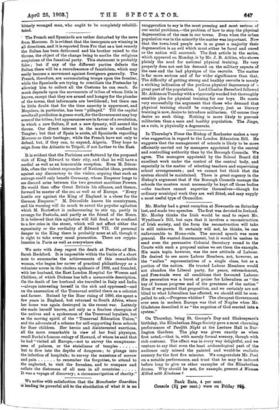Mr. Morley had a great reception at Newcastle on Saturday
last, and made two speeches. The first was devoted to Ireland. Mr. Morley thinks the Irish would be mad to reject Mr. Wyndham's Bill, but says that it involves a reconstruction of Irish society, and the form the reconstruction will take is still unknown. It certainly will not, he thinks, be one unfavourable to Home-rule. The second speech was more general He wanted disarmament, but it would be useless to send even the persuasive Colonial Secretary round to the Courts with such a proposal unless we set them the example. His main topic, however, was the new attitude of Labour. He desired to see more Labour Members, not, however, as the " sullen" representatives of a single class, but as a portion of the nation. He trusted Labour Members would not abandon the Liberal party, for peace, retrenchment, and Free-trade were all conditions that favoured Labour. His peroration was a burst of praise for Liberalism as " the key of human progress and of the greatness of the nation." Even if we granted that proposition, and we certainly are not blind to what Liberalism has effected, we should still be com- pelled to ask,—Progress whither P The cheapest Government ever seen in modern Europe was that of Naples when Mr. Gladstone described it as "the negation of God erected into a system."


























































 Previous page
Previous page